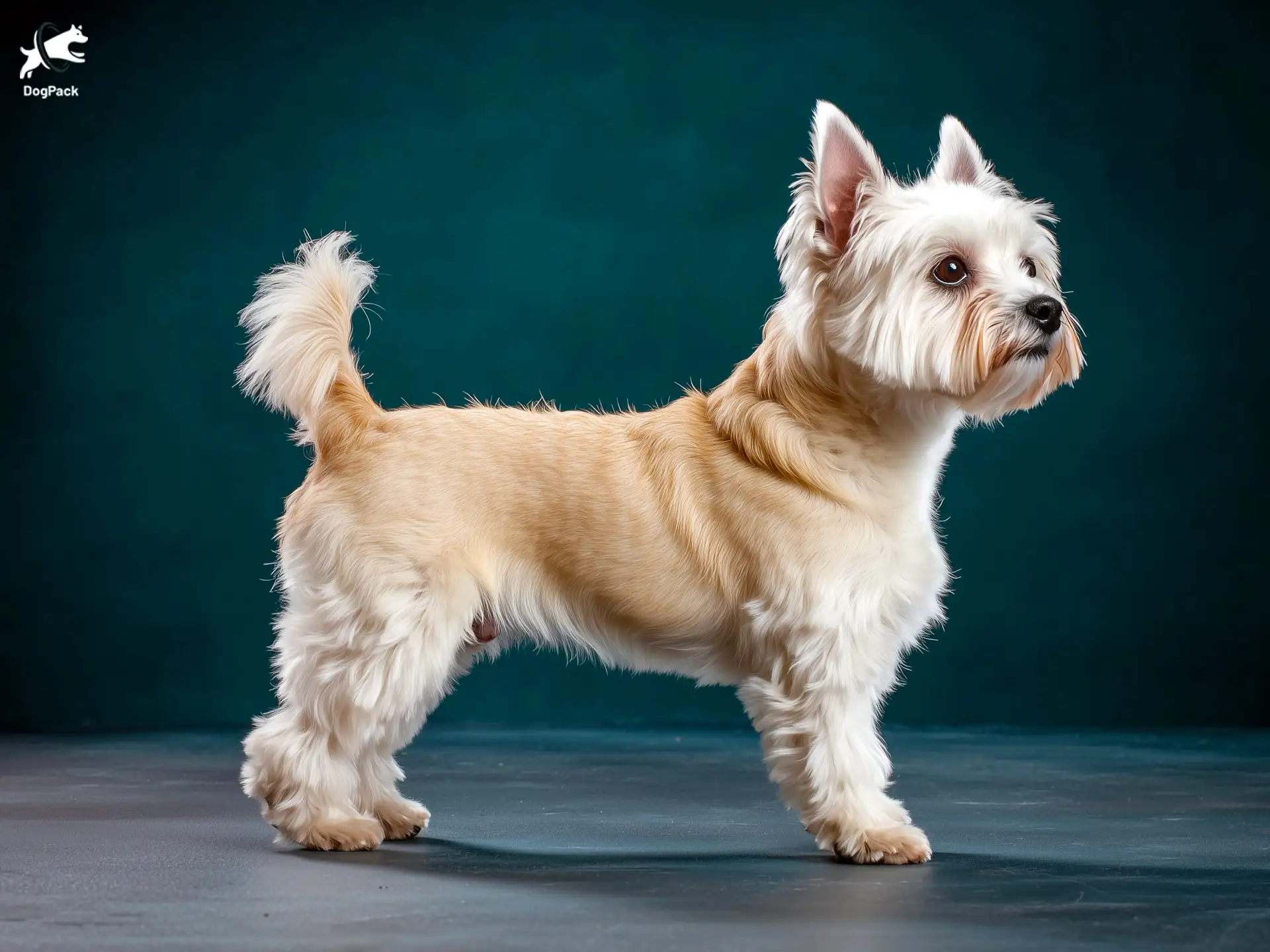Wee-Chon Dog Breed Info & Overview
The Wee-Chon, a delightful mix of the West Highland White Terrier and Bichon Frise, is a small yet spirited companion full of charm. With a low-shedding coat and a friendly, affectionate nature, this hybrid thrives in various living situations, from cozy apartments to busy family homes. Playful, adaptable, and endlessly lovable, the Wee-Chon makes a perfect cuddle buddy and energetic playmate for any household.
Characteristics
Pictures
Breed History
In the past few decades, dog enthusiasts began crossing popular purebreds to create companion animals with endearing traits from each parent. Among these creative mixes emerged the Wee-Chon, a charming blend of West Highland White Terrier and Bichon Frise. This hybrid’s story is closely linked to the rise of “designer dogs” in the late 20th century.
The West Highland White Terrier hails from the rugged mountains of Scotland, where it excelled at hunting small game. Meanwhile, the Bichon Frise, with its Mediterranean origins, charmed European royalty and street performers alike. Combining these two breeds brought together the Westie’s fearless spunk and the Bichon’s gentle, affectionate nature, laying the groundwork for a lively, yet sweet-tempered companion.
Though not formally recognized by major kennel clubs, this cross gained popularity in North America. Owners valued the potential for a lower-shedding coat alongside an upbeat disposition. As interest grew, small-scale breeders refined the cross, emphasizing health and temperament. Today, the lineage of this mix continues to evolve, ensuring each Wee-Chon inherits a charming blend of two beloved parent breeds.
Temperament, Personality
Meeting a cross of two sociable dogs often means a big personality in a small frame. These pups thrive on interaction, constantly seeking attention and cuddles. Their inquisitive nature might lead them to investigate every nook and cranny, but they usually respond well to correction, especially when gentle boundaries are introduced early.
Most display a playful streak that makes them a hit with well-supervised children. They’re typically eager to make friends, though early socialization remains essential to ensure confident greetings. A Wee-Chon, with its cheerful disposition, can adapt quickly to different household dynamics. But keep in mind that these dogs form strong bonds and may follow family members around the house.
Strangers are often greeted with a curious tilt of the head rather than suspicion, but protective instincts can surface if the home environment becomes tense. In multi-pet households, these dogs often get along with other friendly animals, provided introductions occur gradually. Overall, owners find that this mix’s bright personality and love of companionship truly shine in a nurturing, stable setting.
Physical Characteristics
Bred from two small-statured parents, this mix usually stands between 9 and 12 inches (23–31 cm) tall at the shoulder. Compact yet sturdy, they inherit the Westie’s robust frame combined with the Bichon’s soft features. Their round, dark eyes and button nose offer a distinctly endearing look that can melt hearts at first glance.
Most have a fluffy, medium-length coat that feels slightly springy to the touch. While white is the most common color, subtle shades of cream or light tan may appear, depending on the parent lines. This plush exterior not only catches the eye but also provides a protective layer during brisk outdoor adventures.
The Wee-Chon typically maintains a balanced posture, allowing it to navigate tight indoor spaces with ease. Though petite, they’re surprisingly agile and can scamper around the living room with boundless enthusiasm. Ears can vary—some remain upright like a Westie’s, while others droop closer to the face, reflecting the Bichon’s influence.
Health Issues
Both West Highland Terriers and Bichon Frises can be prone to allergies and skin issues, so owners may notice occasional scratching or hotspots. Regular checks for ear infections are wise, as the breed’s folded or semi-folded ears can trap moisture, leading to discomfort if not addressed promptly.
Knee problems, such as patellar luxation, also appear in some lines. Early veterinary screenings help catch structural concerns, and maintaining a healthy weight reduces stress on joints. Dental care is critical too, since smaller dogs can be susceptible to tartar buildup, leading to gum disease and potential tooth loss if neglected.
Overall, the Wee-Chon tends to be fairly robust when responsibly bred. To keep them feeling their best, schedule annual wellness exams and stay current on vaccinations. Some owners opt for genetic testing to rule out inherited conditions, ensuring a proactive approach and a longer, healthier life for their curly-haired companion.
Grooming Needs
Regular brushing is essential to prevent matting in that plush coat. A slicker brush or comb helps remove loose hair and keeps their fur tangle-free. Although they’re considered a low-shedding breed, neglecting routine grooming can result in knots around areas like the ears and underbelly, making brushing sessions more challenging.
Many owners opt for a professional trim every six to eight weeks, especially if they prefer a neat “teddy bear” cut. This schedule not only ensures a tidy appearance but also offers the chance for groomers to check skin health. Bathing should be done as needed, using gentle shampoos that won’t irritate sensitive skin.
A Wee-Chon’s grooming routine typically includes regular nail trims and occasional ear cleaning, too. Monitoring for signs of redness or discharge helps prevent infections before they start. With consistent care and the right tools, these small pups can maintain a charming, fluffy look that turns heads wherever they go.
Exercise Requirements
Despite their petite size, this cross thrives on moderate activity and interactive play. Daily walks help burn off energy and keep joints healthy, while mental stimulation—like puzzle toys—keeps boredom at bay. A few spirited games of fetch or tug-of-war can be enough to tire them out, as they often enjoy short bursts of activity.
Due to their Terrier lineage, they may exhibit a surprising zest for exploration. Supervised backyard time allows them to safely investigate scents and play chase. Indoor living is perfectly suitable, provided they get consistent opportunities to move around and stretch their legs.
A Wee-Chon generally benefits from about 30 minutes of structured exercise each day, but some individuals may crave longer sessions. Keep an eye on energy levels: if they start panting excessively or lagging behind, it’s time for a break. By offering varied, engaging exercise, these pups remain healthy and satisfied.
Training Tips
Early socialization is a key factor in developing a well-rounded companion. Introduce your pup to different people, sounds, and environments to build their confidence. Short, positive training sessions work best, as a small dog’s attention span can wane quickly. Consistency and gentle corrections go a long way in teaching basic commands.
A Wee-Chon often responds enthusiastically to treats and praise, reflecting its people-oriented nature. Be mindful, though, that overindulgence in high-value rewards can lead to picky eating habits or weight gain. Striking a balance between tasty incentives and verbal commendation ensures motivation without spoiling their appetite.
Housebreaking can be easier when a predictable schedule is established, with frequent trips outdoors after meals or naps. Always reinforce good behavior swiftly so they associate the action with the reward. If challenges arise—such as stubborn barking—seeking professional advice early can prevent minor hiccups from becoming ingrained habits.
Nutrition, Diet
Given their typical adult weight range of around 12–18 pounds (5–8 kg), most individuals do well on 1/2 to 3/4 cup of nutrient-dense, small-breed kibble per day. Split this into two meals to help stabilize energy levels and support digestive health. Look for a formula rich in high-quality animal protein, balanced fats, and essential vitamins.
For a Wee-Chon that leans closer to 18 pounds, it may be beneficial to aim for slightly over 3/4 cup daily, adjusting as needed based on activity. Because these dogs can be food-motivated, measuring portions helps prevent obesity, a concern that puts strain on joints and can exacerbate any pre-existing health conditions.
Table scraps should be avoided, especially foods high in fat or containing ingredients unsafe for dogs, such as onions or chocolate. Incorporating occasional healthy treats—like small bits of lean meat or freeze-dried liver—can supplement training sessions without excessive calories. Always consult with a veterinarian to fine-tune the diet, particularly if your pup’s nutritional needs change over time.
Adoption, Breeders
Locating this designer cross often requires patience, as not all breeders specialize in Westie-Bichon mixes. Researching local canine clubs or small-breed enthusiasts can lead to ethical breeding programs that prioritize health screenings. Visiting in person lets you assess living conditions, meet the parent dogs, and understand the breeder’s dedication to socialization.
For those considering adoption, online resources like Petfinder or local rescue networks occasionally list Wee-Chon dogs in need of a new home. Some Westie and Bichon rescue groups also work with mixed breeds, so reaching out can increase your chances of finding a compatible companion. Be prepared for waiting periods, as demand often surpasses availability.
When purchasing from a breeder, confirm that genetic testing has been performed to detect potential hereditary issues specific to both parent breeds. Request health certificates and ask about early vet visits or vaccinations. A transparent breeder should provide guidance on grooming, diet, and training to ease the transition. For more in-depth information, Bichon Frise Club of America offers valuable insights.
Family Pet?
Small yet sturdy, this cross often becomes a beloved fixture in households with children. Their playful spirit and gentle demeanor mean they can handle spirited playtimes, provided the kids are taught respectful handling. Establishing boundaries helps prevent mishaps, and many families find that supervised interactions turn these dogs into patient, entertaining companions for youngsters.
Because they enjoy human company so much, a Wee-Chon can adapt well to homes where someone is around for extended periods. This close bond often means they’ll snuggle up on the couch or shadow family members from room to room. Families that appreciate affectionate dogs typically find this breed’s constant devotion both endearing and comforting.
In multi-pet situations, they do best when introduced gradually, giving each animal space to adjust. Many get along with resident cats, thanks to their low prey drive. As with any breed, ongoing socialization is key to promoting positive interactions. Whether in a small apartment or a spacious home, these pups enjoy being part of everyday activities.
Right For You?
Choosing the perfect canine companion depends on lifestyle, living arrangements, and personal preferences. This cross typically suits owners seeking an alert yet friendly pet that thrives on attention. While they don’t demand extensive outdoor adventures, they do require daily engagement, whether it’s a short stroll, a puzzle toy, or gentle playtime in the yard.
For potential owners with allergies or limited space, a Wee-Chon can be a great match, given its low-shedding coat and modest exercise needs. They excel in environments where they receive ample affection and consistent routines, but might struggle with frequent long absences. Prospective families should evaluate their schedules to ensure adequate companionship.
Additionally, first-time dog owners may appreciate how trainable and eager to please this mix can be. Those looking for a vigilant guard dog should consider a different breed, as these pups tend to greet newcomers with curiosity rather than suspicion. Overall, a warm, loving home is key to bringing out the best in this charming hybrid.
Conclusion
With its playful demeanor, compact size, and irresistible charm, this hybrid can brighten up just about any household. From beginner owners to busy families, many find that daily walks, regular grooming, and heartfelt snuggles are enough to keep these pups happy and healthy. If you’re drawn to a dog that adores human interaction and offers a cheerful disposition, the Wee-Chon may be your perfect match. Just be prepared for an abundance of tail wags and cuddle sessions, as this breed thrives when it’s loved wholeheartedly.
FAQs
-
Does the Wee-Chon retain the hypoallergenic qualities of the Bichon Frise?
Yes, the Wee-Chon often inherits the low-shedding coat of the Bichon Frise, making it a better option for allergy sufferers. However, since it’s a mix, coat types can vary, so individual dogs may shed slightly more than a purebred Bichon.
-
How does the Wee-Chon’s personality compare to its parent breeds?
The Wee-Chon combines the playful energy of a Westie with the friendly, social nature of a Bichon Frise. It tends to be outgoing, affectionate, and highly trainable, though it may inherit some of the Westie’s independence and stubborn streak.
-
Are Wee-Chons prone to excessive barking?
The Wee-Chon may be more vocal than a Bichon due to its Westie lineage, which has strong watchdog instincts. While they are alert and will bark at unfamiliar noises, early training can help curb excessive barking habits.
-
How much exercise does a Wee-Chon need daily?
Despite its small size, the Wee-Chon is energetic and requires about 30–45 minutes of exercise daily. Short walks, interactive play, and mental stimulation help keep them happy and prevent boredom-related behaviors.
-
Is the Wee-Chon a good choice for families with kids?
Yes! The Wee-Chon’s affectionate and gentle nature makes it great for families, especially those with children. However, early socialization is recommended to ensure they develop patience and proper interactions with younger kids.
Breed Ratings
The Wee-Chon is quick-witted, picking up commands fast with consistent sessions and plenty of positive reinforcement.
The Wee-Chon thrives on interactive fun, from fetch to tug-of-war, bringing boundless enthusiasm and joy into daily life.
The Wee-Chon enjoys moderate exercise but can surprise you with bursts of spirited zoomies around the living room.
Though low-shedding, the Wee-Chon still needs regular brushing to keep loose hair under control and maintain a neat coat.
Being part Terrier, the Wee-Chon might chase small critters, but training and supervision minimize any intense hunting instincts.
With a soft, wavy coat, the Wee-Chon requires routine brushing and occasional trims, though grooming isn’t overly difficult.
Eager to please, the Wee-Chon typically excels with positive methods, though short sessions and patience yield the best results.
The Wee-Chon is highly social and may become anxious when left solo for long stretches, needing gradual separation training.
Vocal tendencies vary, but the Wee-Chon may alert-bark at unusual sounds or visitors, typically quieting with reassurance.
Drool is rarely an issue for the Wee-Chon, making them a great choice for owners who prefer a tidier home environment.
The Wee-Chon generally gets along with other pups if socialized early, showing a playful and welcoming nature in group settings.
When responsibly bred, the Wee-Chon is robust, but routine vet checks and preventive care help ensure a long, healthy life.













